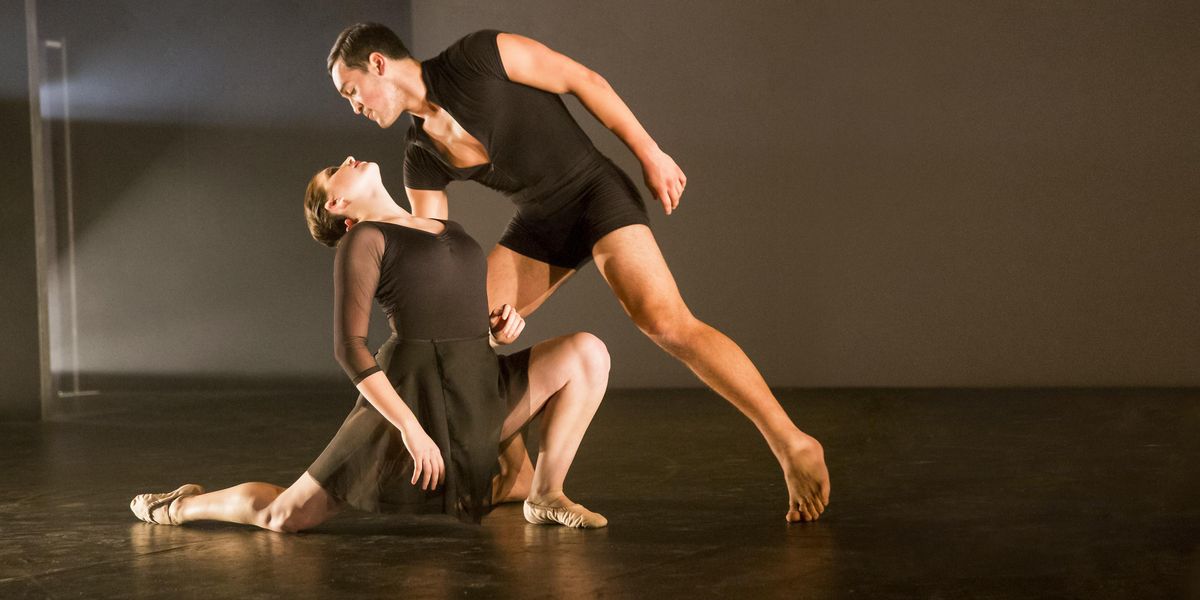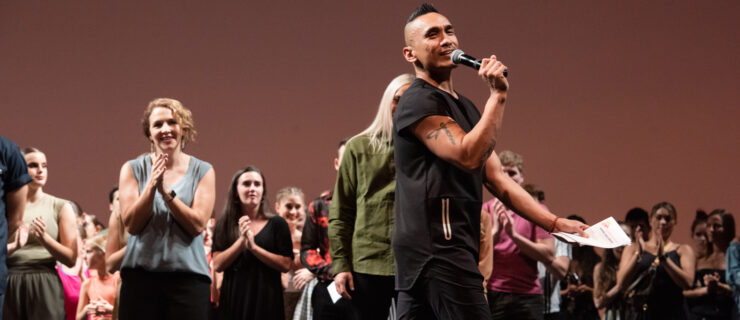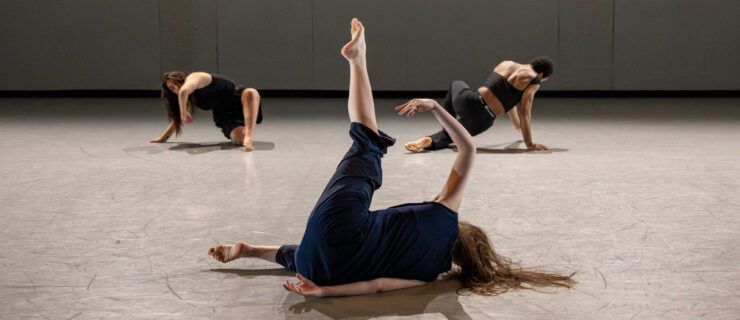AMDA’s Dance Theatre Program Is the Launch Pad for Your Bicoastal Career
When veteran performers talk about the moment their careers took off, their stories usually all have three things in common: They had the right skills, knew the right people, and were in the right place. For young dancers, achieving this not-so-secret trifecta of prerequisites is daunting, to say the least. And yet AMDA College of the Performing Arts has been helping aspiring professionals do just that, and more, for more than half a century.
Read on to see how AMDA’s one-of-a-kind bicoastal dance training program prepares dancers to break into the industry—or industries, rather—with the training, connections and insider lowdown they need to succeed in both of the world’s artistic capitals.
The People and Places Dancers Need to Succeed
At AMDA, the term “faculty” is basically code for “Professionals Already Doing What Students Dream Of.” From Broadway to the big screen, AMDA’s dance professors not only have drool-worthy performance resumés spanning both coasts, they’re eager to share their hard-earned connections and experience with the next generation. And since most of them are still working in the industry, their info is always up-to-date, which is more crucial now than ever as the dance world continues to radically shift post-pandemic.
For AMDA alum Jazz Washington, connecting with teachers at AMDA in both L.A. and NYC was the first step to developing their network, and their confidence as a professional. “Since I was planning to stay in at least one of those cities after graduating, I could keep up those relationships and meet even more people in the arts community through them,” Washington says. “Starting out postgrad, I felt like I knew so much more than the people I was auditioning alongside. The confidence that my AMDA teachers had in me gave me that special edge.”
As a former AMDA alumnae herself, AMDA dance professor Chryssie Whitehead-Disbrow has a keen sense of the benefits of challenging students to step outside their comfort zones. “I’m rooting for these dancers, because I remember clearly what it was like to be in their shoes,” she says. “My goal is for each one to see what’s possible for them in all aspects of the performing arts.”
At AMDA, developing your artistry is just one piece of the puzzle—navigating daily life in not just one but both entertainment capitals of the world is a whole other special skill in itself. That’s why AMDA makes sure students are supported both in the studio and out. In NYC, AMDA houses students at one of two residence halls in the Upper West Side, just a short walk away from the campus, major arts attractions like Lincoln Center and the theater district, and the city’s most renowned open-class dance studios. “Looking back, it’s crazy that I lived by myself in NYC at 18 years old,” Washington remembers. “It prepared me to roll with the punches and adapt to anything.”
AMDA’s L.A. campus
is also built for convenience: According to AMDA alumnae and NYC-based artist Presley Gookin, “Everything you’d need is within walking distance—it’s nice not to have to worry about the cliché of L.A. traffic right away.” Spending time on the West Coast expanded Gookin’s expectations not just of where she could live one day but of the path her career could take. “I was never too familiar with commercial styles, but now that I’ve gotten a few semesters at AMDA under my belt, and met people and learned how the city works, I feel like I could move to L.A. anytime, and have what I need to succeed,” she says.

AMDA alumnae Presley Gookin
Taso Papadakis, Courtesy AMDA
The Creative Edge
As the pandemic has proven, the ability to stay open-minded and pivot quickly are musts for a sustainable dance career. For that reason, AMDA’s curriculum makes creativity a top priority. From courses on storytelling and content creation to a dedicated Choreography Showcase, AMDA students graduate with the tools to not only book work, but also to produce opportunities of their own.”You don’t have to be competitive when you come to AMDA. It’s about creation—we want to help you discover what makes you unique, and develop that,” Whitehead-Disbrow says.
When her choreography class was moved to Zoom due to the pandemic last semester, Whitehead-Disbrow used the time to guide her students in producing their own dance films at home. “Throughout the whole process, I encouraged them to speak up about what they thought of the whole process. It was difficult for them, but they rose to it, and we found some silver linings during that time,” she says.
Similarly, Washington’s experience participating in the Choreography Workshop Showcase sparked their vision to one day start a company of their own. “Between our Senior Showcase, Choreography Workshop, and my courses, I had ample opportunities to practice not only being a dancer, but a director and choreographer, too. I learned what it takes to put on a show,” Washington says.

AMDA alum Jazz Washington
Chehon Wespi-Tschopp, Courtesy AMDA
Practical Training, Practical Results
From courses on networking to how to create an industry-standard reel, AMDA’s Dance Theatre curriculum is a pre-professional’s paradise. Aside from daily core technique classes, students have ample time to dive into those cherry-on-top dance styles, like ballroom and partnering, that today’s dance work demands. “We’ll never promise any dancer at AMDA that they’re going to book. But we give them all of the tools they need to be successful in today’s climate, and prepare them for their actual job, which is to audition,” Whitehead-Disbrow explains.
Thanks to AMDA’s bicoastal design that allows BFA students to spend 4 semesters at each campus, Gookin learned practical skills to succeed in both the commercial and theater-dance worlds. “My favorite class in L.A. was Heels,” she says. “It was a whole semester dedicated to learning the technique and fundamentals of dancing in stilettos, which you don’t get from taking drop-in classes.” Similarly, Gookin’s musical-theater training went one step further in NYC. “Faculty and AMDA alumni taught us original Broadway choreography and songs from shows they were in,” she explains. “It was my first introduction to singing and dancing at the same time, a difficult, but super-necessary skill to develop.”
Both in and out of class, the folks at AMDA are committed to helping their students jumpstart their performance careers. “In your final semester in NYC, all of your classes get moved to afternoons and evenings, so you can audition or take class and network during the day,” Gookin says.
In her case, that led to booking a contract with Norwegian Cruise Lines. Thanks to her advisors at AMDA, Gookin was able to take time off to perform, and when she returned, she picked up right where she had left off. “AMDA was so flexible in helping me navigate when it was best for me to finish my BFA. Even though I was gone for a while, they never forgot me or my goals,” she says. Ultimately, Gookin’s time at AMDA culminated in one of the L.A. campus’s Industry Showcases, where top agents and directors are invited to scout new talent. “The Senior Showcase is like you auditioning for L.A., and I was fortunate enough to sign with MSA shortly after,” she says.

Students have multiple performance opportunities throughout their time at AMDA
Taso Papadakis, Courtesy AMDA
Ready to Audition? You’ve Got Options
‘Tis the season for college auditions, and this year, AMDA is providing options for in-person, virtual or video auditions. If you’re nervous about applying to AMDA’s Dance Theatre program, or just wary of virtual auditions in general (we feel you), take heart: AMDA’s professors understand the unique challenges of Zoom, and they’re not looking for perfection.
“Choose material that you love and resonate with, not what you think we want to see, and be prepared to talk about it,” says Whitehead-Disbrow. “At AMDA we’re big on individuality and things being a two-way street—we want both teachers and students to share our experiences and learn from each other.” Basic technique in ballet and jazz is recommended, but not always required, for admission. “We know not everyone has the resources to receive proper training,” Whitehead-Disbrow says. “Along with technique, we also truly value whether someone has the necessary raw talent and work ethic, and the desire to perform in their heart.”
If you’d like to attend one of AMDA’s virtual open houses or schedule an audition, check out more information and dates here.




